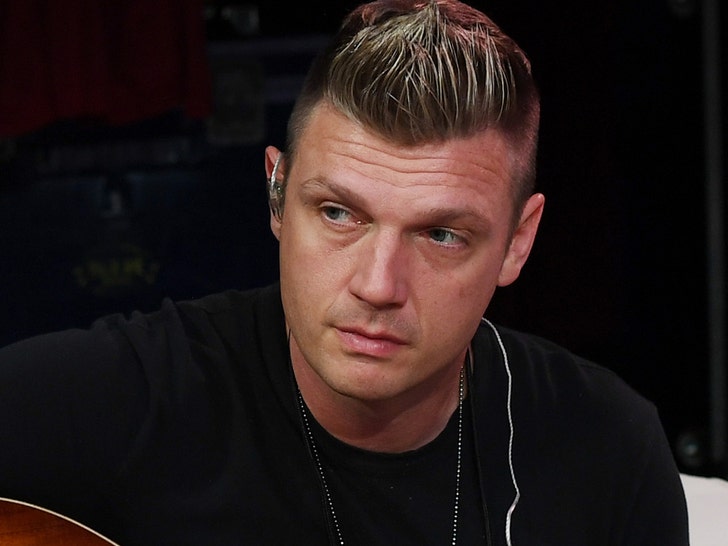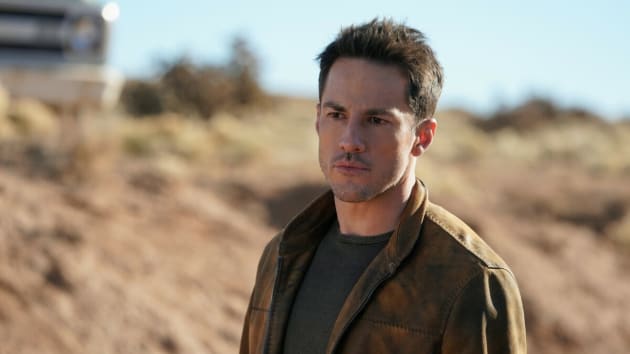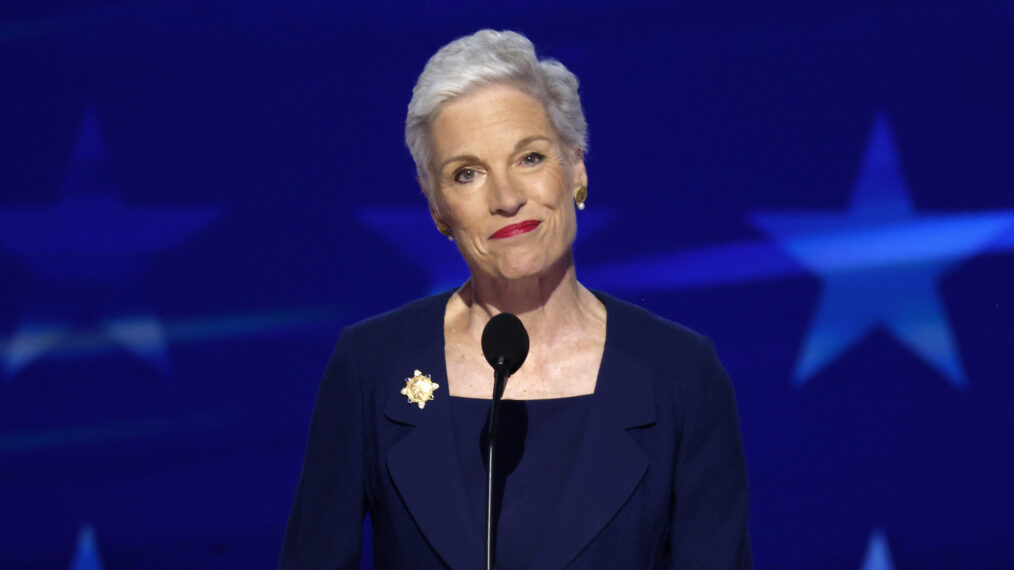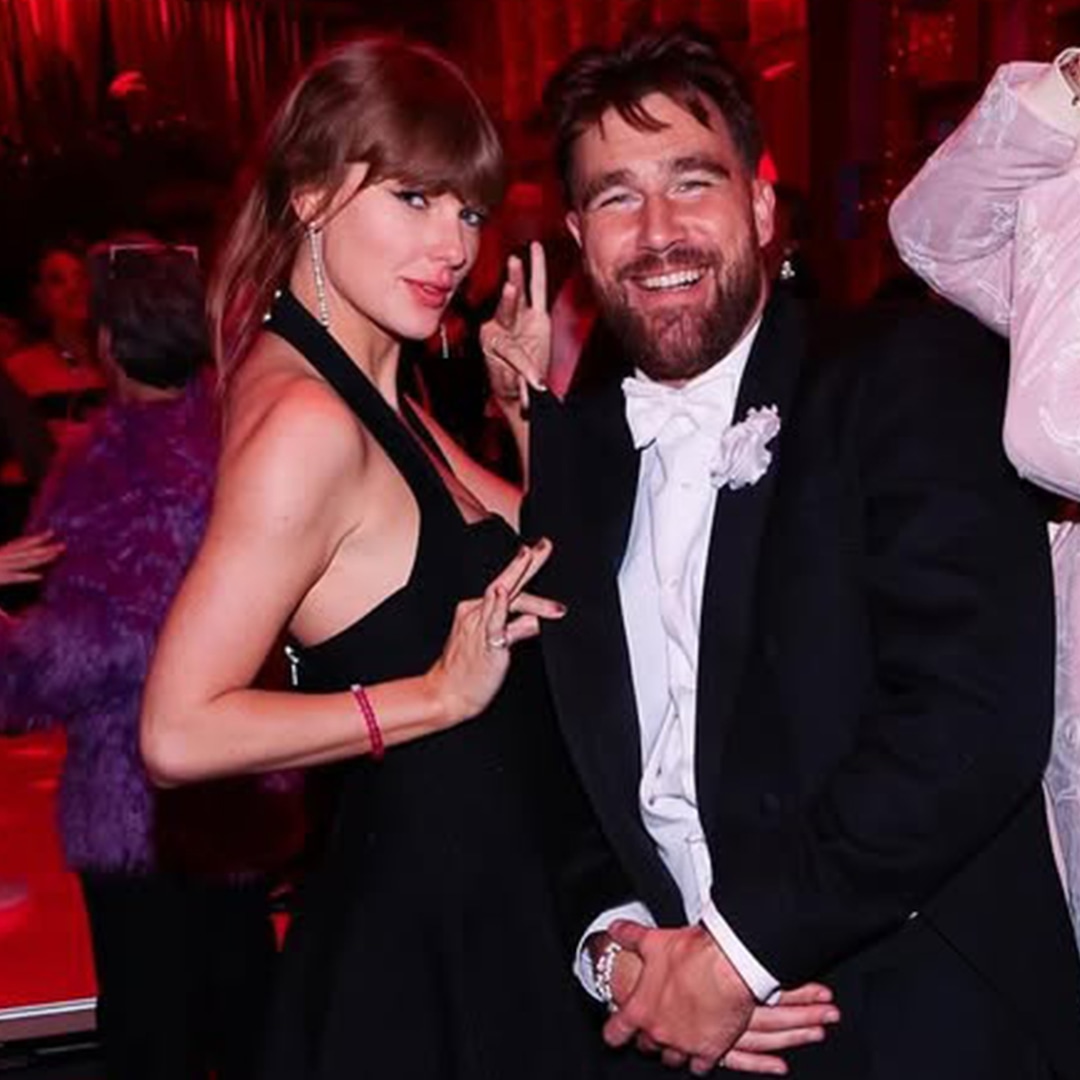“The idea [of the show] was to give a backstory to that game as you know it and the characters and make you appreciate that world more,” executive producer Carter Swan says.
The first season of Twisted Metal, an action comedy based on the PlayStation game series about an outsider offered a chance at a better life if he delivers a mysterious package across a post-apocalyptic wasteland, builds to a car tournament; John Doe (Anthony Mackie) finds out he’s been enlisted by Raven (Neve Campbell) to participate at the end of the finale. As a result, the show spends time with John and Quiet (Stephanie Beatriz), revealing their backstory through flashbacks.
“It’s something that’s not really in the game — it’s sort of something you read in the game — but we actually wanted to show it and show you where these people all really came from and how they came together,” Swan continues, praising the writers for the idea. As a result, “when the car tournament battle does happen, you’re just more invested. You love these people and they’re more than just cars driving around. It’s more about the people inside of ’em.”
Below, Carter and fellow executive producer Asad Qizilbash from PlayStation Productions reflect on Season 1 and tease what could be ahead if the action comedy is renewed.
When you first started planning and you looked at the game and what you wanted to bring to the show, what were the musts for Season 1?
Carter Swan: I don’t ever think we actually did a must list because Rhett Reese and Paul Wernick knew the material so well that we really wanted to see what they could do. The game doesn’t have a really tight narrative to follow something like The Last of Us. Really what they came to us with is 99 percent of what the season was, so there were really no boundaries we put in. But I will say I liked the idea early on of, let’s give some backstory to the game you know so well. Let’s show you how the car tournament came together, and let’s give you some backstory on these characters so you’re more invested in them because in the original game, the characters are the cars, and in a TV show, that’s not as compelling. So we wanted you to really be more involved in and care and understand where these people were coming from and why they were doing it.
Asad Qizilbash: There were three things that was really important to us because it’s so important we sort honor and respect the game franchise that fans so love. What was really important was tone, and the show really does mirror that irreverent tone of what the game is that was so important. Second thing was iconic characters because there’s a huge list of [them] and it was important to get some of the key ones in there. And what I really loved about what we did with the show versus the game — obviously, the game is all about car combat, so how do you create a narrative around that that just doesn’t feel like it’s been redone many times before? I liked the way the narrative weaved in survival through your cars and this relationship with your cars in a really special way. I thought that was done really well and subtly.
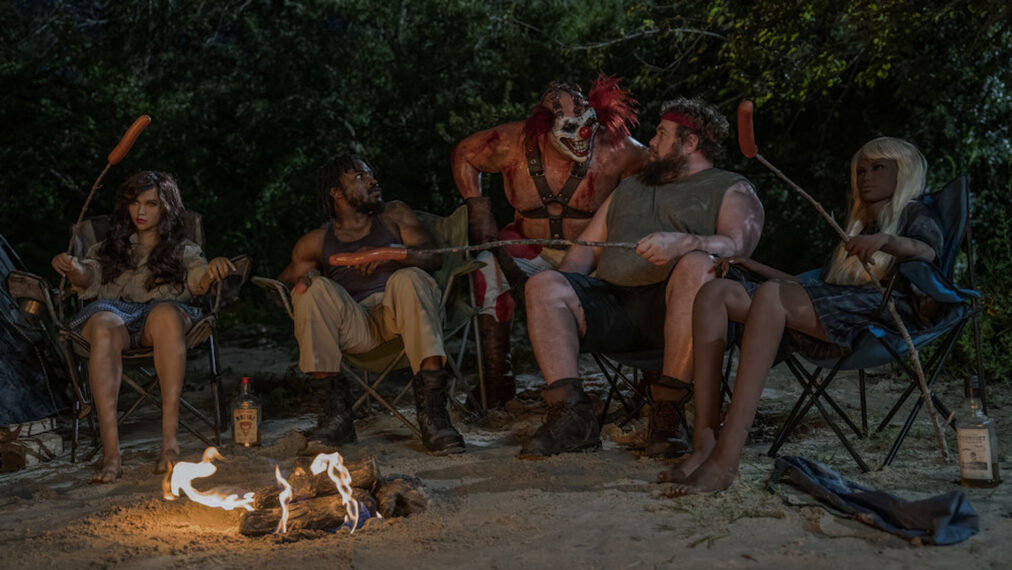
Skip Bolen/Peacock
Of course we specifically have to talk about setting Sweet Tooth’s (Joe Seanoa, voiced by Will Arnett) head on fire, a moment that fans were obviously waiting for. Talk about building up to that moment with the exploration of his backstory. The asylum was so good.
Swan: I can’t underscore it enough: The people who worked on this show are all fans and we all love the game. Showrunner Michael Jonathan Smith was such a massive fan and did such a great job at identifying those iconic things, and that was always a priority for him: How can I weave these little intricacies that people remember from the game throughout the show? The flaming head of Sweet Tooth was one of ’em that early on he was mentioning, “I have to have that in there.” It actually happens twice. There’s a shot in the second episode where he’s walking in front of a fire and he’s in slow motion and it looks like it. And then later on actually doing it was important to him and something that he honestly figured out and put a lot of time and thought into to weave in there because that was one of those moments. He’s like, “We got to have this in there. That’s so Sweet Tooth, he’s got to have his head on fire.”
What did you want to see from John to take him to a point where he would be ready for that race if there’s a second season?
Swan: We always wanted to just give all these characters more backstory and more interesting backstories. That idea of who John would be came from Rhett and Paul, and we loved it from the beginning. The idea of, this guy’s a Pony Express driver in the post-apocalypse, and because of that and because he had to drive for his life through these hostile territories, it’s made him an unbelievable driver in some ways. But going back to the first episode, he doesn’t know how to parallel park because that never really comes into play in the post apocalypse. I think that was something of an idea of Rhett and Paul’s. They’ve done such a great job with that character in Deadpool and making this kind of funny, irreverent, never takes anything too seriously, and is always able to see the sunny side of things [character].
We all knew that was important because when you do post-apocalyptic stuff, usually it’s pretty heavy. Rhett and Paul had done Zombieland as well, which was one of those few movies that was fun in the post-apocalypse; they said early on, there is a little bit of wish fulfillment to post-apocalypse of you being able to go into a mall and just do whatever you want. So they were really good and obviously had experience in mining those moments and thinking about those moments and applying it to this character. It was really important that he had the disposition that he did so the show never felt really heavy. We didn’t want it to. We wanted it to constantly be fun.
Qizilbash: The shows that we really like are when there are lots of smaller stories that you’re so invested in, but there is always a bigger greater story. And we also liked the idea of these head fakes that you weren’t expecting. I don’t think anyone saw that coming, but we’re trying to figure out how we’re going to weave in the tournament into the show, and so it just sort of hit perfectly where we delivered on what the fans were hoping for, that there’s a story around the tournament, but also there’s this great head fake around the whole meta story of the show as well. I can’t compliment the writers enough on just how they weave that in together so you care episode to episode, but there’s something even bigger at the end, which was cool.
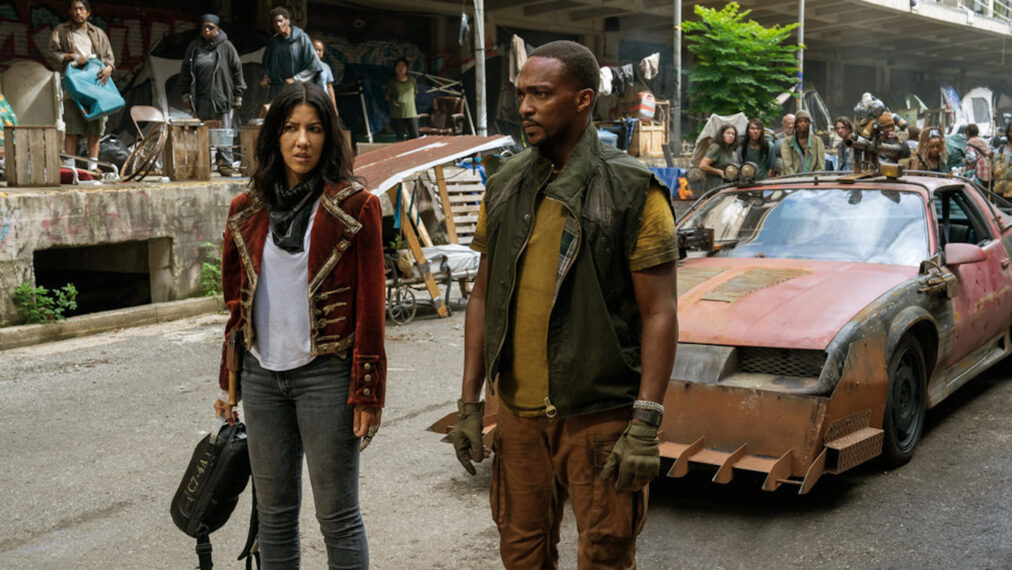
Skip Bolen/Peacock
John and Quiet’s relationship was great, then she’s not allowed in New San Francisco. But if she had been and that was what they thought it was, would they have even been happy there considering the life outside they were so used to?
Swan: No. I don’t think so. They grew up in a free world and have that fun in the post-apocalypse thing where they could go and do whatever they want and I think boxing ’em in like that, they eventually would get tired of that and actually living in this tightly wound running society. They’re more like free spirits, people who moved out west and that lawless, crazy land where anything went. I think that they were sort of bred and born in that. So they need that and putting them into society just makes them outcasts immediately and eventually they would want to break free.
Yeah, Quiet at the end is doing what she’s meant to be doing.
Qizilbash: That’s why I love that question. That’s why I love the scenes at the end when you can see John’s restless and it becomes repetitive. It’s so well done the way he’s enjoying his time there, but then it’s repetitive over and over again, and he misses that open road. He misses the unpredictability of the world. That’s just how he’s built. So I love that juxtaposition of this perfect pristine world versus what they really love.
Is there any chance that Stu (Mike Mitchell) is still alive, or was he dragged to his death?
Swan: [Laughs] You are going to have to watch hopefully the next season.
So it’s supposed to be open-ended? Or is it something worse than death maybe? Their dynamic was great.
Qizilbash: When it comes to Sweet Tooth, you never know. Even Stu and Sweet Tooth, it’s all about relationships. [While] the Quiet-John one was great. I thought the Stu and Sweet Tooth [relationship] is just as important and great. So I’m glad you picked up on that. That’s really important.
Swan: Stu’s trying to fit in, and in the beginning, they’re taken by the police state and try to become lawmen and Stu doesn’t fit in really there. And then later on, of course, leaving…
Qizilbash: There’s an underlying story there. There’s a lot of misfits if you think about. Everyone’s in a situation they just didn’t fit into, and even Sweet Tooth is misunderstood. That’s what’s great. [It’s] so well-written and again, compliment to the creators. They’ve just done a great job of creating so many different layers to the characters and the situation they’re in.
At the end of the finale, if John had to choose between Quiet and Evelyn, if he still had his car, what would he have done?
Qizilbash: I’ve got my answer.
Swan: That’s a tough question.
Qizilbash: It’s Evelyn. I mean, the love, that episode, it moves you. The fact that I’m hearing so many fans saying, “I’m literally crying over a car…” The bond he has with Evelyn is so deep-rooted. It’s family, it protected him. So I’ll say it’s Evelyn, hands down, just because of what it meant to him and the life he had.
Swan: I don’t know. I actually think he would choose Quiet, and that’s part of the growth of the character is discovering that humanity, there is some beauty to it, because I think in the beginning, we kind of demonstrate that what he’s longing for is the family. Even though he loves his car and it’s the love of his life and it’s the one thing that’s given him shelter and protected him from the world and allowed him to survive, I think that he learned to love Quiet throughout the show in a way and really realize what it is to invest in other people.
Qizilbash: I like that answer. I’m going to go with that as well. The Wilson moment in Cast Away, that’s the emotion you want. It was there, but now it’s time to move on to real life. The fact that we have two different answers just shows how many levels the story has, which is great.
Though so much is up in the air due the strikes, can you share anything about any conversations you’ve had in the past about a second season? Would it be just the tournament?
Swan: Given the ending, it’s out there. That’s one of the obvious next places to go. It needs to be more expanded than that. You can’t do a whole season that’s literally just a car battle every episode. I don’t think that would be exciting television show for anybody. Maybe, I don’t know. There was obviously a reason that we set that up.
Qizilbash: I’ll also say what’s great is that there are so many places that we can go narratively, characters, introducing characters, going deeper into other character stuff. So I think the goal there is to try and keep it open enough, and the IP lends itself to so many ways we can go.
And Jason [Mantzoukas] as Preacher was great.
Swan: Oh, yeah. I first saw him on The League, and what I was amazed with was he was a very side character, but he absolutely stole every scene he was in. He owned every scene. I remember back then thinking, this guy is incredible. He’s an incredible comedian. He’s so funny. When he came up for that part, I was calling Sony TV and everybody, “We have to get him. We have to do whatever it takes to get him. He’s going to be incredible.” So happy we got him. He’s somebody that I had wanted to work with for years.
Twisted Metal, Season 1, Streaming Now, Peacock


























































![Mason Ramsey – Twang [Official Music Video] Mason Ramsey – Twang [Official Music Video]](https://i.ytimg.com/vi/xwe8F_AhLY0/maxresdefault.jpg)





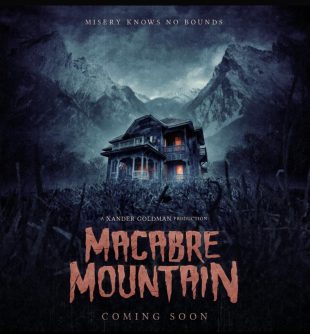
:quality(85):upscale()/2023/08/29/812/n/1922564/2e11666364ee394cefdd12.31198516_.jpg)
